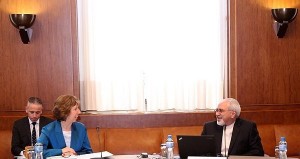 GENEVA: The Iranians have offered a two-step framework�to resolve their nuclear crisis, a source close to the talks told Breaking Defense.
GENEVA: The Iranians have offered a two-step framework�to resolve their nuclear crisis, a source close to the talks told Breaking Defense.Iran�s plan presented today to the United States and five other world powers is designed to show Iran�s good will and to�lay the groundwork for a breakthrough. It outlines time frames for Iran to meet international demands that it guarantee it does not seek nuclear weapons. The first step could take place within three to six months. This would include Iran giving up 20 percent enrichment of uranium, which is closer to weapon-grade than uranium enriched for normal power reactor fuel, the source said in exclusive comments to Breaking Defense. During this stage Iran would also agree to provide more information, access and assurances about its work at a reactor being built at Arak. That reactor would be able to produce plutonium.
The overall deadline for Iran to wrap up all issues concerning its nuclear program would be a year, said the source, who asked not to be identified due to the sensitivity of the matter. Much work remains to be done before anyone can declare a breakthrough, the source close to the talks tells us.
Obama, as well as Kerry, have stressed that the good will of the Iranians would have to be matched by concrete acts. A senior US official put it in proverb form. �The proof is in the pudding and the devil is in the details,� the official said.
Other key issues to be addressed are Iran possibly limiting its enrichment and reducing the number of centrifuge machines doing it. It was not clear if these or other issues were specifically brought up.
The latest plan continues the string of remarkable developments since Hassan Rouhani took office as Iranian president in August. Rouhani has led a turn away from confrontation over Iran�s nuclear ambitions and towards negotiation. In September, Rouhani spoke directly by phone to President Barack Obama. Iranian Foreign Minister Javad Zarif had days earlier at the United Nations in New York sat down for a bilateral talk with Secretary of State John Kerry, the first such high-level meetings since the Islamic Revolution in 1979 turned Iran and the United States into enemies. They marked a surprising rapprochement that has raised hope that the Iranian nuclear crisis can be settled by diplomacy rather than war.
Today�s meeting here was praised by European Union spokesman Michael Mann as �very useful.� But Mann said: �We do need more detail from the Iranian side.�
A senior US State Department official said that for the first time in the seven years of talks with Iran �we had very detailed technical discussions.�
Iranian rhetoric and dogma seem to be yielding to the sort of technical discussion which could lead to an agreement. That is in itself huge progress in a crisis that has frustrated diplomacy since it began in 2002 when Iran was discovered hiding work on both uranium enrichment and possible reprocessing of plutonium, the two main routes to making an atomic bomb.
Diplomats to the Geneva meeting were tight-lipped to the press on Tuesday about the details of the Iranian plan due to the fragility of the new chance for a solution and the need to refine what the Iranians are proposing. The source said the Iranians had stressed that the proposal presented by Zarif at the first of the so-called P5-plus-1 meetings with Iran to be in English, rather having the Iranian delegate�s native Farsi translated, showed what the Iranians were willing to do and how things could be worked out.
Abbas Araghchi, Zarif�s deputy foreign minister who took over from Zarif for the afternoon session, told the Iranian press � according to the Iranian news agencies Isna and Fars � that �the two sides must restore confidence in a mutual way.� Araghchi said the final agreement must use the fatwa (religious decree) of Iranian Supreme Leader Ali Khameini that Iran will never build or use nuclear weapons.
In addition, Iran must be guaranteed the right to enrich uranium and be able to have a civilian nuclear program. Resolutions against it at the United Nations Security Council, which call on Iran to suspend enrichment, must be canceled.
Iran is to allow UN nuclear inspectors on its territory, as it already does, but it was not clear if Iran would meet international demands that it ratify an Additional Protocol which it has signed which allows for even wider inspections.
And there would be a precise timetable to taking non-proliferation measures, Aragachi said, according to Isna and Fars.
Aragachi also told the Iranian press that measures taken by Iran to rein in its nuclear program and by the United States and its allies to reduce sanctions should be simultaneous and matching in importance.
The talks in Geneva are scheduled to wrap up Wednesday. Diplomats said they did not expect a final agreement. But the Geneva meeting�would be a big first step in a new process marked by good will and businesslike behavior on both sides.�Michael Adler,
This article was written by �Michael Adler for Breaking Defense on October 16,2013.�Michael Adler,�a veteran foreign correspondent, is an Iranian expert at the Wilson Center in Washington.�He writes often on the Iranian nuclear crisis.
The Iran Project is not responsible for the content of quoted articles.










